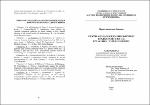I hereby declare that I will use the electronic library contents in compliance with COPYRIGHT AND RELATED RIGHTS ACT, Article 24, paragraph 1, item 9, only for scientific, cultural and educational purposes, without commercial gain, without commercial interest and non-profit.No Yes
Study of the molecular effects of inhibition of C1q in patients with Lupus Nephritis // Проучване на молекулни ефекти от инхибирането на C1q при болни с лупусен нефрит
Date
2011Author
Radanova, Maria
Раданова, Мария
maria.radanova@mu-varna.bg
Metadata
Show full item recordAbstract
[EN] The subject of this thesis is C1q - recognizing molecule of the classical pathway of the complement system, which interacts with a wide range of target molecules. The main objective of the research is the study of three endogenous mechanisms of inhibition of C1q in order to clarify the role of S1q in the pathogenesis of Systemic Lupus Erythematosus(SLE) patients with lupus nephritis. The three tested inhibitory effects are: 1.Existing genetic defect - mutation or polymorphism in the genes for C1q, leading to suppressed expression of a molecule or to an impaired functional activity; 2.Nalichie anti-C1q autoantibodies as inhibitors of the interaction of C1q to its target molecules; 3. Interaction of C1q with heme as an inhibitor of the activation of complement by the classical pathway. Original contributions: 1. Acquired evidence of allele frequencies for four different polymorphism (rs587585, rs292001, rs294179 and rs631090) in the genes for C1q in healthy volunteers and in Bulgarian patients with lupus nephritis: lack of correlation between the allele frequencies and the risk of developing the disease was found. 2. It was discovered and characterized for the first time the functional deficiency of C1q, associated with normal plasma levels of C1q. 3. Antibodies to the globular C1q fragment (anti-gC1q antibodies) were discovered in patients with established lupus nephropathy. 4. A specific inhibitory effect of anti-gC1q antibodies on the interaction of C1q with its target molecules IgG and CRP was established.5. The inhibitory effect on heme on IgG- and CRP - mediated complement activation by directly binding to C1q, is established for the first time as well. [BG] Обект на настоящата дисертация е C1q - разпознаваща молекула на класическия път на системата на комплемента, която взаимодейства с широк набор от прицелни молекули. Основната цел на десертационния труд е проучване действието на три ендогенни механизма на инхибиране на C1q оглед изясняване на ролята на С1q в патогенезата на СЛЕ при пациенти с лупусен нефрит. Трите изследвани инхибиторни ефекта са: 1.Наличие на генетичен дефект - мутация или полиморфизъм в гените за C1q, водещ до потисната експресия на молекулата или до нарушена функционална активност; 2.Наличие на анти-C1q автоантитела като инхибитори на взаимодействието на C1q с негови прицелни молекули; 3. Взаимодействие на C1q с хема като инхибитор на активацията на комплемента по класическия път. Приносите на настоящия дисертационен труд са: 1.За първи път са получени данни за алелните честоти за четири различни полиморфизма (rs587585, rs292001, rs294179 и rs631090) в гените за C1q в здрави доброволци и в пациенти с лупусен нефрит от България и е установена липса на корелация между алелните честоти и риска от развитие на заболяването. 2.За първи път е открит и характеризиран функционален дефицит на C1q, асоцииран с нормални плазмени нива на C1q. 3.За първи път са открити антитела срещу глобуларния фрагмент на C1q (анти-gC1q антитела) в пациенти с доказана лупусна нефропатия. 4.Открит е специфичен инхибиращ ефект на анти-gC1q антителата върху взаимодействието на C1q с прицелните му молекули - IgG и CRP.5.За първи път е установен инхибиторен ефект на хема върху IgG- и CRP-медиираната комплементна активация чрез директно свързване с C1q.

